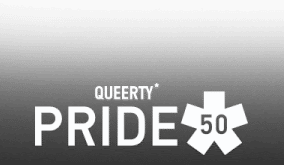
Welcome to Screen Gems, our weekend dive into queer and queer-adjacent titles of the past that deserve a watch or a re-watch.
The Unparalleled: Cloud Atlas
Audiences didn’t know what to think of this 2012 opus, directed by transgender auteurs Lily & Lana Wachowski, as well as their frequent collaborator Tom Tykwer (director of Run Lola Run). A movie that cast actors in multiple roles across the racial and gender spectrum? Six different stories set in six different time periods in six different genres? What kind of movie does that?
The answer is, a magnificent one. The format of Cloud Atlas makes it difficult to summarize. In the 1840s, an American doctor (Jim Sturgess) develops a relationship with an enslaved man (David Gyasi) and becomes an ardent abolitionist. In the 1930s, a gay composer (Ben Whishaw) pens a quintet as an ode to his boyfriend (James D’Arcy), only to have it stolen by another composer. In the 1970s, the composer’s lover helps an investigative reporter (Halle Berry) expose eco-terrorism. In the present, an aging author (Jim Broadbent) involuntarily committed to a nursing home plots his escape. In the distant future, an anti-totalitarian rebel (Sturgess, again) kidnaps a cloned fast-food worker (Doona Bae). In the even more distant future, a tribesman (Tom Hanks) guides a scientist (Berry, again) to an abandoned communication station in hopes of escaping a dying Earth.
You got all that?
How about we take this to the next level?
Our newsletter is like a refreshing cocktail (or mocktail) of LGBTQ+ entertainment and pop culture, served up with a side of eye-candy.
Understanding the plot (or plots) of Cloud Atlas does very little in the way of explaining the film itself, or its deeper meaning. The film meditates on how lives interconnect over time, and posits that true love guides us toward one another in lifetime after lifetime. Some critics have charged that the film is racist, which is simply not true: the film actually argues that gender, race and sexuality have no real meaning by using its cast in multiple roles regardless of race or gender. Casting Doona Bae as a white woman, Susan Sarandon as a man, or Hugo Weaving as a woman simply underlines the point that while our souls can take many physical forms, something deeper and intangible connects us. Cloud Atlas makes the radical statement that love is love, and moreover, love will save us all in the end. It’s a film unlike any other ever made–one that explores the fluidity of sexuality and gender–and a thrilling cinematic experience.
Streams on Tubi, iTunes, YouTube & VUDU.
Don't forget to share:



















































Kangol2
Not so sure about the film, but David Mitchell’s novel Cloud Atlas, on which it’s based, is a work of genius and one of the most original and daring English-language novels of the last 25 years. (PS: If you do read the novel, do note that the UK and US versions are textually distinct, since the US edition lost its original editor and got a new one, Mitchell was early in his career when this masterpiece was published and did not know that he could request that the two major English-language editions be identical.)
gevorg
Invitation to a sex club – xmeet.fun
jjose712
The film is really difficult to follow because the novel is complex and you can’t use the narrative Mitchell used in the novel, so the mix all the six storylines (with pretty poor results). There was a reason people thought Cloud Atlas was one of those books impossible to adapt (maybe a tv show could do it soe justice).
Anyway, the trailer is really great (and unlike the movie, it captures the spirit of the novel)
jayceecook
This is one of those are instances where I loved the film and absolutely hated the book. As usual I saw the film first, because the books usually are better or expand upon what I enjoyed in the film, and was so excited to see what the book would be like. I did get a used UK copy off eBay or somewhere.
About a third of the way through the book I was so disappointed but I kept reading and reading until I finished most of it. I stopped because it was such a chore to get through. Very little of what I enjoyed in the film was in the book. Thinking about it I realized that most of what I loved about the film couldn’t ever be in the book because the mediums are so vastly different. A lot of the themes and messages in the film were nowhere to be found on the book. This is probably one of the loosest adaptations I’ve seen. It feels more like an “inspired by” rather than a “adapted from” scenarios.
Is the film perfect? No. I’ve never seen one that is and I’ve seen A LOT. However it’s far better than some people would have you believe. Not even Halle Berry could ruin it for me. Looking back I wonder if it should have been a series, much like it’s thematic sibling Sense8, instead of a movie. All in all it’s a wonderful film and highly underrated.